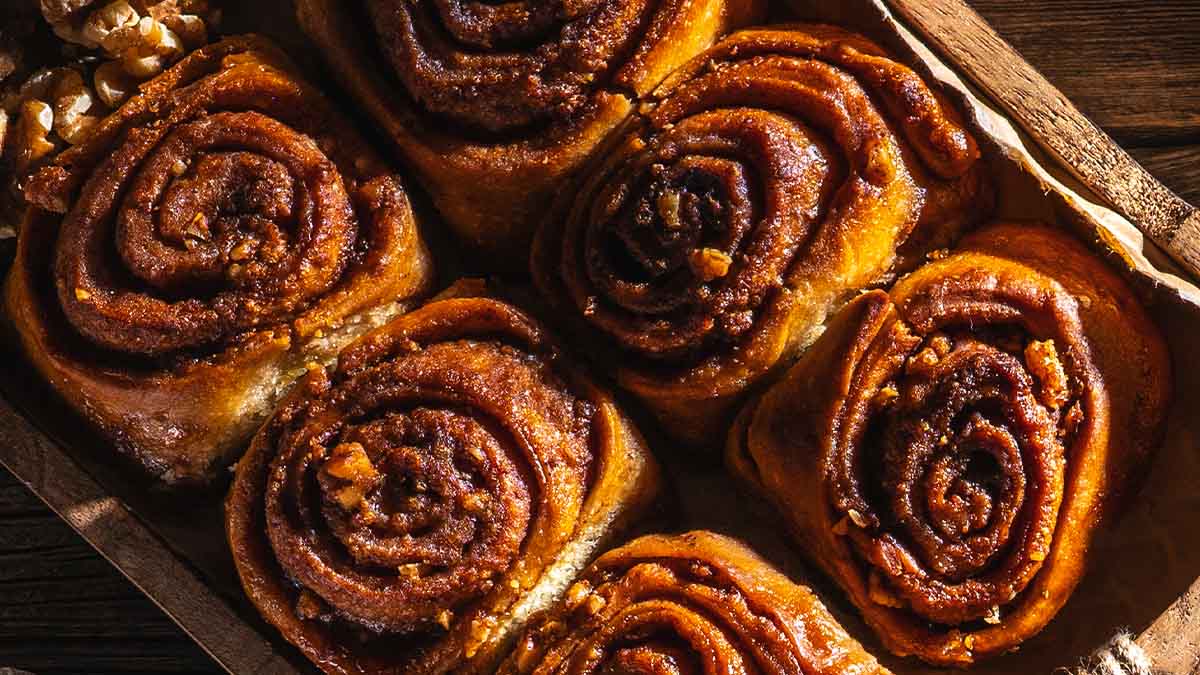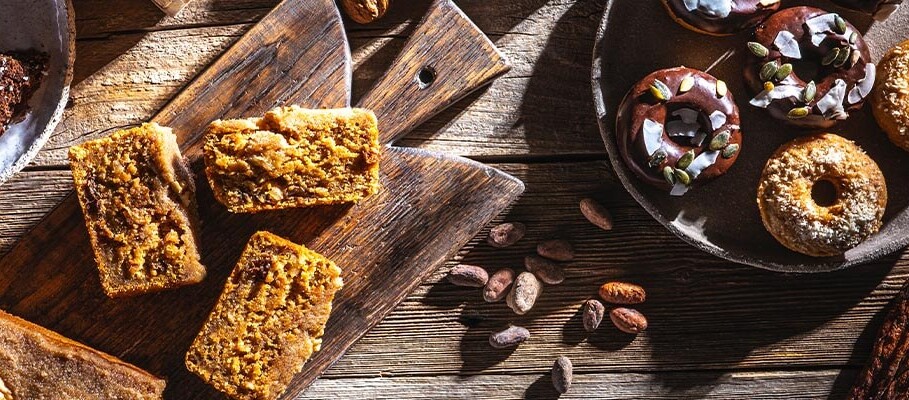Table of Contents
- The Untapped Potential of the Vegan Sweets Market
- Essential Ingredients for Vegan Bakeries
- Mastering Vegan Chocolate: Techniques and Applications
- Vegan Croissants: Achieving Flaky Perfection Without Butter
- Producing Vegan Birthday Cakes and Other Large-Format Treats
- Pro Tip: Source Smart for Vegan Sweets
- Workflow Optimization for Vegan Bakeries
- Marketing Your Vegan Sweets to a Wider Audience
- Conclusion
1. The Untapped Potential of the Vegan Sweets Market
The global vegan food market is experiencing exponential growth, driven by increasing consumer awareness of health, ethical, and environmental concerns.
A 2023 report of Fortune Business Insights estimates the market to grow from 26.16 Billion in 2023, to USD 61.35 billion by 2030. You can find this insightful article on their website: Vegan Food Market Size, Share and Growth Analysis, 2032.
This surge in demand extends beyond dedicated vegan consumers; a significant portion of the growth comes from "flexitarians" or "reducetarians" – individuals who are actively reducing their consumption of animal products.
This presents a massive, and often untapped, opportunity for bakeries. How can B2B businesses effectively tap into this expanding market?
The advantages are multiple for incorporating vegan alternatives:
- Expanding Customer Base: Offering vegan options immediately broadens your potential customer pool.
- Premium Pricing: Vegan products, often perceived as "premium" or "specialty," can command higher prices.
- Positive Brand Image: Aligning with ethical and sustainable practices enhances brand reputation.
- Increased ROI: Expanding the customer base helps improve the return on investment.
However, there are also important considerations to keep in mind when venturing into the vegan sweets market.
One factor is ingredient costs; while many plant-based staples are affordable, some vegan alternatives, such as certain specialty plant-based butters, can initially be more expensive than their traditional counterparts.
Another consideration is the need for recipe development. Adapting traditional recipes to be vegan-friendly isn't always a straightforward substitution; it often requires experimentation and thorough testing to achieve the desired taste, texture, and appearance.
Furthermore, ensuring consistent quality across all products necessitates proper staff training. Bakery personnel need to be well-versed in handling vegan ingredients and understanding the nuances of vegan baking techniques.
Finally, it's important to acknowledge the potential for increased market saturation. As the popularity of vegan options continues to rise, more businesses are entering the space, leading to greater competition.
2. Essential Ingredients for Vegan Bakeries
Successfully creating delicious vegan sweets hinges on understanding and utilizing the right ingredients. While traditional baking relies heavily on eggs, dairy milk, and butter, a wide range of plant-based alternatives can deliver comparable, and sometimes even superior, results.
What are the key ingredients to consider?
- Plant-Based Milks: Soy, almond, oat, coconut, and rice milk are readily available and offer different flavor profiles and textures. For example, soy milk is high in protein, making it a good choice for custards, while oat milk's creamy texture works well in cakes.
- Vegan Butters: These are typically made from a blend of plant oils (like coconut, palm, or sunflower) and are designed to mimic the properties of dairy butter in baking.
- Egg Replacers: Several options exist, each with its strengths:
- Flaxseed Meal: When mixed with water, flaxseed meal forms a gel that acts as a binder.
- Chia Seeds: Similar to flaxseed, chia seeds create a gelatinous texture.
- Commercial Egg Replacers: These are often powder-based blends of starches and leavening agents.
- Aquafaba: The liquid from canned chickpeas, aquafaba can be whipped into a meringue-like consistency.
- Apple Puree: Ideal in cakes.
- Sweeteners: Besides regular sugar (ensure it's vegan, as some sugar is processed using bone char), options include maple syrup, agave nectar, date syrup, and coconut sugar.
- Flavorings: Vanilla extract and chocolate, which are often already vegan.

3. Mastering Vegan Chocolate: Techniques and Applications
Vegan chocolate is a cornerstone of many desserts, and the good news is that high-quality options are increasingly available.
Dark chocolate, in many instances, is inherently vegan, provided it doesn't contain milk solids. However, for milk chocolate and white chocolate alternatives, look for products specifically labeled as vegan.
What are the different types of vegan chocolate, and how can they be used effectively?
Types of Vegan Chocolate
- Dark Chocolate: Often naturally vegan; check the ingredient list for milk products.
- Vegan Milk Chocolate: Made with plant-based milk (like coconut, rice, or oat milk) instead of dairy milk.
- Vegan White Chocolate: Typically made with cocoa butter, sugar, and plant-based milk solids.
Techniques
- Melting: Use a double boiler or microwave in short intervals to avoid burning.
- Tempering: This process, crucial for achieving a glossy finish and a satisfying snap, is similar for both vegan and non-vegan chocolate. It involves carefully controlling the temperature to encourage the formation of stable cocoa butter crystals.
Applications
- Ganache: Made with vegan chocolate and plant-based cream, it's perfect for fillings, frostings, and truffles.
- Mousse: Aquafaba or silken tofu can be used to create a light and airy vegan chocolate mousse.
- Decorations: Vegan chocolate can be used for shavings, curls, and other decorative elements.
- Cookies and cream: Combine crushed vegan cookies (many popular brands are accidentally vegan) with melted vegan white or milk chocolate for a classic flavor combination.
4. Vegan Croissants: Achieving Flaky Perfection Without Butter
The vegan croissant presents a unique challenge: replicating the buttery, flaky layers that define this classic pastry.
However, with the right techniques and high-quality vegan butter, it's entirely achievable. How can bakeries produce vegan croissants that rival their traditional counterparts?
- Vegan Butter is Key: Choose a vegan butter specifically designed for lamination (the process of folding butter into dough to create layers). These butters have a higher melting point and fat content, crucial for creating distinct layers.
- The Lamination Process: The technique is largely the same as with traditional croissants, involving multiple folds and chills to create thin layers of dough and butter. Precision and patience are essential.
- Proofing: Allow sufficient time for the croissants to proof (rise) before baking. This develops flavor and ensures a light, airy texture.
- Baking: Bake at a high temperature initially to create steam, which helps lift the layers, then reduce the temperature to finish cooking through.
5. Producing Vegan Birthday Cakes and Other Large-Format Treats
While individual pastries are important, catering to larger events like birthdays and celebrations is a significant revenue stream for bakeries. Producing vegan birthday cakes and other large-format vegan sweets requires adapting recipes and techniques for scale.
How can bakeries efficiently produce large quantities of vegan cakes without compromising quality?
- Recipe Scaling: Carefully scale up recipes, paying attention to the interaction of ingredients. Simply multiplying a small recipe may not always yield the desired results.
- Equipment: Consider investing in larger mixers, ovens, and baking pans to handle increased volume.
- Baking Time and Temperature: Larger cakes require longer baking times and potentially lower temperatures to ensure even cooking.
- Decoration: Streamline the decoration process. Consider using stencils, simple piping techniques, or pre-made vegan decorations to save time.
6. Pro Tip: Source Smart for Vegan Sweets
B2B success in vegan sweets relies heavily on smart ingredient sourcing. Don't just accept higher prices; actively seek specialized vegan ingredient wholesalers. These suppliers often provide better pricing and selection than general distributors.
Negotiate bulk discounts and build strong supplier relationships. Consistent, high-volume purchasing unlocks significant savings. Treat suppliers as partners – this can lead to better deals, new product access, and valuable market insights, boosting your profitability and competitiveness in the growing vegan market.
If you are looking for the ideal supplier for your vegan baking projects, request a quote on europages: https://www.europages.fr/en/rfq.

7. Workflow Optimization for Vegan Bakeries
Efficiency is crucial for any B2B operation, and vegan bakeries are no exception. Optimizing workflow can reduce costs, minimize waste, and ensure consistent product quality.
How can bakeries streamline their processes for vegan production?
- Dedicated Workspace: If possible, designate a separate area for vegan baking to prevent cross-contamination with non-vegan ingredients.
- Ingredient Storage: Clearly label and organize all vegan ingredients to avoid confusion.
- Batch Production: Prepare large batches of base components (like vegan buttercream or cake layers) in advance to save time.
- Staff Training: Ensure all staff members are knowledgeable about vegan ingredients and procedures.
- Inventory Management: Track ingredient usage carefully to minimize waste and ensure you always have enough stock on hand.
8. Marketing Your Vegan Sweets to a Wider Audience
Having a great product is only half the battle; effective marketing is essential to reach potential customers. How can bakeries effectively promote their vegan sweets to both vegan and non-vegan audiences?
- Highlight the "Vegan" Aspect: Clearly label all vegan products and use signage and menu descriptions to emphasize them.
- Target Flexitarians: Appeal to the growing number of consumers who are reducing their meat and dairy intake.
- Focus on Taste and Quality: Emphasize that vegan doesn't mean compromising on flavor or texture.
- Social Media Marketing: Use high-quality photos and videos to showcase your vegan creations. Engage with the online vegan community.
- Partnerships: Collaborate with vegan restaurants, cafes, and businesses to expand your reach.
- Offer Samples: Let customers try your vegan products to overcome any initial skepticism.
If you are a vegan baking professional or a supplier for vegan ingredients, request a consultation with our team to see how you can offer your services or products on our platform and reach a vast network of potential B2B clients.
For more information about food trends and innovations, read these insightful articles:
- Advancing Market Potential with Plant-Based Food Innovations
- Fermented Foods: Benefits, Trends & Sustainability
- Edible Food Packaging: A Sustainable Future?
- Foodceuticals: The Future of Food & Health

9. Conclusion
Plant-based eating isn’t just a passing trend—it’s a major shift in what consumers want, driven by ethical, environmental, and health reasons.
For bakeries, keeping up with this change means more than just adding a few vegan options. It’s a chance to tap into a growing market and set up for long-term success. Learning how to make delicious vegan sweets—like rich vegan chocolate treats, flaky vegan croissants, and impressive vegan birthday cakes—is becoming an essential skill, not just a specialty. Businesses that embrace this shift, improve their recipes, and build strong supplier partnerships will have the best chance to grow.
Looking ahead, there’s even more potential in combining vegan baking with personalized nutrition. Instead of just being plant-based, could bakeries create products tailored to specific health needs?
Imagine vegan sweets with added vitamins, protein, or adaptogens, designed for athletes, people with allergies, or those with specific wellness goals. This mix of vegan baking and customized nutrition could be the next big opportunity for B2B bakeries.
Find Suppliers for Your Vegan Projects!
AMAZONAS Naturprodukte Handels GmbH: Offers high-quality, naturally-sourced ingredients like fruit powders and extracts since 1995, perfectly catering to vegan dessert recipes that call for authentic and vibrant fruit flavors. The company's commitment to gentle processing and direct sourcing ensures superior quality and potent nutritional benefits, vital for the discerning vegan baker.
L'Arbre Persan: Is a B2B importer and distributor of premium Iranian, Afghan, and Central Asian products, including dried fruits, seeds, powders, and saffron—ideal ingredients for creating exceptional vegan sweets. Their extensive selection of high-quality, European-standard-compliant items, like rose petals, pistachios and various dried fruits and flours, caters directly to the needs of pastry chefs crafting innovative plant-based desserts.
The Ingredients Experts: This company provides high-quality, non-GMO plant-based proteins essential for modern, sustainable food innovations, perfectly aligning with the needs of vegan baking and confectionery. Boasting excellent texture, flavor, and high biological value, these proteins offer optimal water-binding and emulsifying properties, making them ideal for use in vegan sweets and a wide range of other applications.
Th. Geyer Ingredients: Supplies food and beverage businesses with a comprehensive range of flavors, colorants, and functional components from globally recognized brands, relevant for enhancing the taste and appearance of vegan sweets. With over 45 years of experience and a global distribution network, the company provides vital ingredients and support for crafting high-quality, plant-based confections.
Agri Cereal Mandorle: Specializes in high-quality, natural and organic almonds, including whole, shelled, and processed forms like almond flour and granules—perfect ingredients for vegan baked goods and desserts. Their advanced processing and focus on quality make them a key supplier of essential components for creating authentic and flavorful vegan sweets.
Fräulein Lisa GmbH: This company specializes in producing high-quality, palm oil-free, and predominantly vegan cookies in a variety of flavors, catering directly to the growing demand for plant-based treats. Offering flexible production, custom recipes, and organic certification, they supply a wide range of businesses across Europe, making them a versatile source for vegan cookie options.
Gutschermühle Traismauer: Excels in the B2B development and production of bars, muesli, and snacks, offering a relevant source for vegan-friendly options in the confectionery and snack market. With over 30 years of experience, this company provides customized snack solutions to both established brands and startups, potentially including a range of plant-based bars or muesli perfect for complementing a vegan sweets article.
PVN The Licorice World: Offers a wide selection of licorice and other confectionery specialties from Denmark, Sweden, the Netherlands, and Germany, potentially including vegan-friendly options suitable for a sweets-focused article. The company caters exclusively to resellers, providing both loose and pre-packaged goods with customizable labeling options.
Chocri GmbH: This company crafts exquisite vegan chocolates using a base of fine dark chocolate and creamy rice milk-based "Vegolade," ensuring rich flavor without any animal products. Their customizable offerings, exemplified by the "World Tour" selection of chocolate squares with vegan toppings, directly address the demand for high-quality, plant-based confectionery.
Sweets Factory Ltd.: Specializes in producing delicious sugar-free, gluten-free, and dairy-free vegan snacks and sweets, leveraging the extensive experience of its parent company in the Hungarian alternative food market. Offering product development, manufacturing, and packaging services, including bar extruding, molding, and spread production, they are a dedicated resource for creating innovative, plant-based confections.
Bojati Food GmbH: This company provides co-packing and private label solutions for dry food products, including mixing, filling, and packaging various bag formats—a service potentially valuable for vegan sweet brands. Their comprehensive offerings, from product development and raw material sourcing to marketing and packaging design, make them a useful partner for bringing plant-based confections to market.

